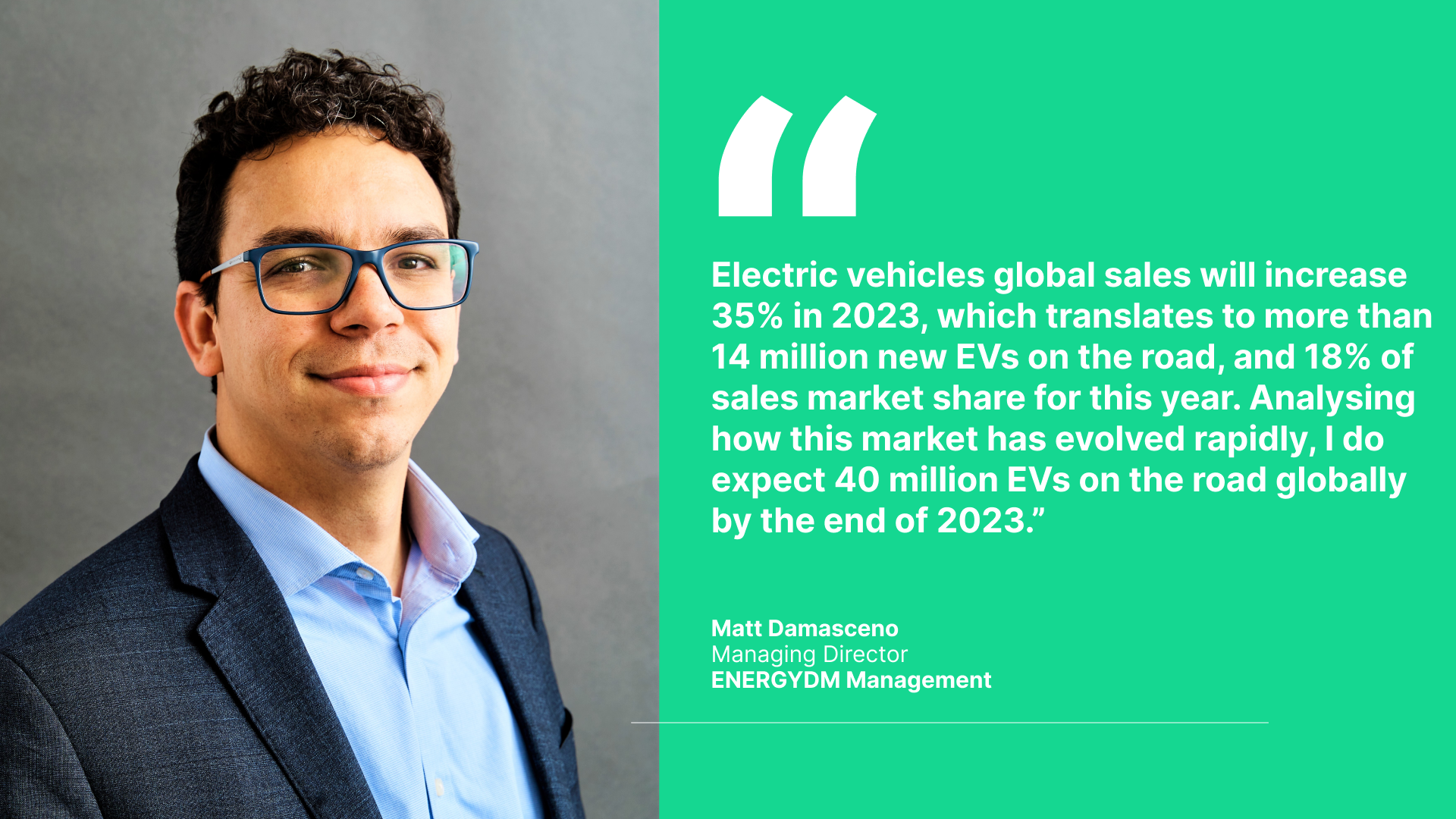In this exclusive Q&A session, Matt Damasceno, a leading name in the EV industry, shares his perspective on the current state and future trends shaping the electric vehicle industry. From the growth of EV sales to the role of electric vehicles in autonomous driving and advice for companies entering this market, Matt provides valuable insights into the rapidly evolving automotive landscape.
LEVS: How do you see the current state of the electric vehicle industry and what are the key trends or developments shaping its future?
Mr Damasceno: Vehicle electrification has emerged as one of the most significant advancements in the automotive industry in recent decades. Electric vehicle (EV) sales have consistently increased globally, even during the last challenging years for the overall automotive industry. Year after year, EV adoption has increased exponentially in the three key markets: China, Europe, and the United States.
Looking at the future, ENERGYDM Management team forecasts that electric vehicles global sales will increase 35% in 2023, which translates to more than 14 million new EVs on the road, and 18% of sales market share for this year. Analysing how this market has evolved rapidly, I do expect 40 million EVs on the road globally by the end of 2023.
The blooming EV industry is backed by key trends and technological advancements. Notably, advancements in Lithium-ion battery technologies are leading to higher energy density, fast charging capabilities, and extended lifespan throughout the vehicle's lifecycle. The development of new electrical/electronic (E/E) vehicle architectures is supporting the integration of Advanced Driver Assistance Systems (ADAS) and enabling higher levels of autonomous driving.
Moreover, the shift towards software-defined vehicles offers a fresh perspective, transcending hardware-centric limitations and promoting innovative approaches to vehicle design. Cloud-based services are facilitating greater connectivity, faster over-the-air software updates, enhancing vehicle safety, efficiency, and user experience. These trends collectively drive the evolution of the EV industry and contribute to the ongoing transformation of the automotive landscape.
LEVS: With the increasing adoption of autonomous driving technology, how do you envision the future of mobility and the role of electric vehicles within it?
Mr Damasceno: The automotive industry is witnessing significant advancements that are making vehicles safer while rapidly enhancing the capabilities of Advanced Driver Assistance Systems (ADAS) to support drivers on the road. These advancements are paving the way to autonomous driving at L3, L4, and L5 SAE automation levels.
The transition to battery electric and software-defined vehicles plays a vital role in driving this industry evolution, enabling continuous software updates, improved connectivity, new vehicle features, and a shift towards cleaner mobility, reducing reliance on fossil fuels.
However, it is crucial to acknowledge that achieving SAE L5 vehicle automation level is a multi-year or even multi-decade endeavor. This journey requires extensive testing, robust data processing capabilities, and rigorous validation to ensure maximum safety and minimize potential liabilities associated with autonomous driving.
LEVS: As a sales and business strategies expert in the electric vehicle industry, what advice would you give to companies looking to enter or expand their presence in this market?
Mr Damasceno: Vehicle electrification is disrupting the automotive business as we know it today. It presents both remarkable opportunities for companies to expand their product offerings, increase revenue, and gain market share, as well as potential risks that could lead to revenue decline and business failure, if these new trends are not embraced.
To thrive in this evolving market, it is essential for companies, including Tiers 1/2/3, suppliers, service providers, and aftermarket companies, to proactively prepare for the challenges and opportunities of the electrified automotive industry.
This entails adopting new market approaches, investing in employee training, developing new services, acquiring relevant skill sets, and ensuring familiarity with high-voltage systems and safety requirements. Additionally, companies must focus on enhancing their capabilities in automotive software diagnosis, making investments in new equipment, and establishing in-house testing, validation, and repair capabilities to stay competitive in the rapidly changing vehicle electrification market. By embracing these changes, companies can position themselves for success and effectively navigate the transformative shift toward vehicle electrification.
LEVS: Can you share some examples of successful projects or initiatives you have been involved in within the automotive electrification sector, and what were the key factors contributing to their success?
Mr Damasceno: It has been an exciting ride in the automotive electrification sector, and I have been strongly involved in projects in the United States, South America, and Europe. My involvement has encompassed diverse areas, such as, lithium-ion battery and technology evaluation, along with commercial and strategic consulting initiatives, enabling revenue growth through innovative thinking and detailed business strategies.
Undoubtedly, a critical factor contributing to the success of these endeavors has been the cultivation of a robust network and strong partnerships within the automotive electrification realm. These connections have facilitated meaningful collaborations with new business partners and companies, fostering an environment of knowledge exchange, discovery of cutting-edge technologies, and effective implementation of transformative changes in this dynamic and competitive market.
LEVS: How can events like the London EV Show contribute to the advancement and growth of the electric vehicle industry?
Mr Damasceno: Facilitating connections among various stakeholders, including new companies, professionals, startups, organizations, and government entities, is of extreme importance to ensure collective progress in the electric vehicles market. The London EV Show plays an important role in fostering this collaborative environment by providing a platform for companies to showcase their latest products and innovation and creating awareness among new users and electric vehicle drivers.
I do feel this event serves also as an educational hub, bringing knowledge about EVs and their benefits, ultimately driving the adoption and acceptance of electric mobility. By connecting diverse stakeholders and promoting knowledge exchange, the London EV Show contributes to the advancement of the EV industry and the transition towards a sustainable future.

